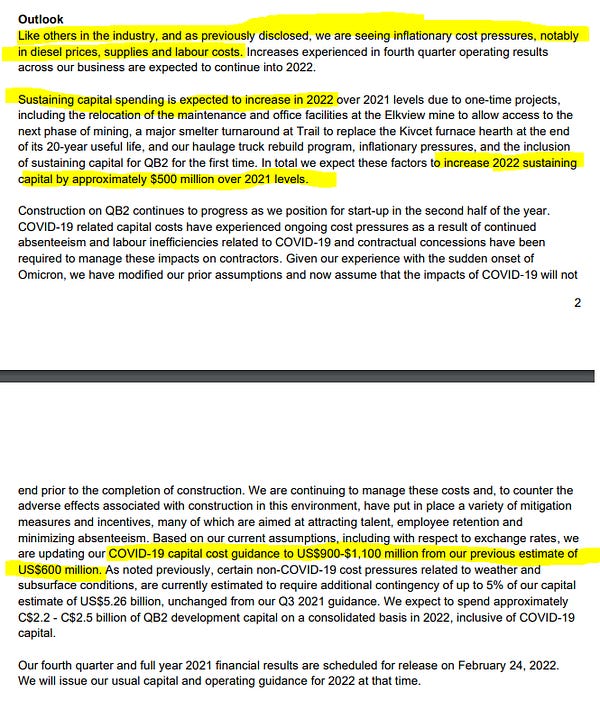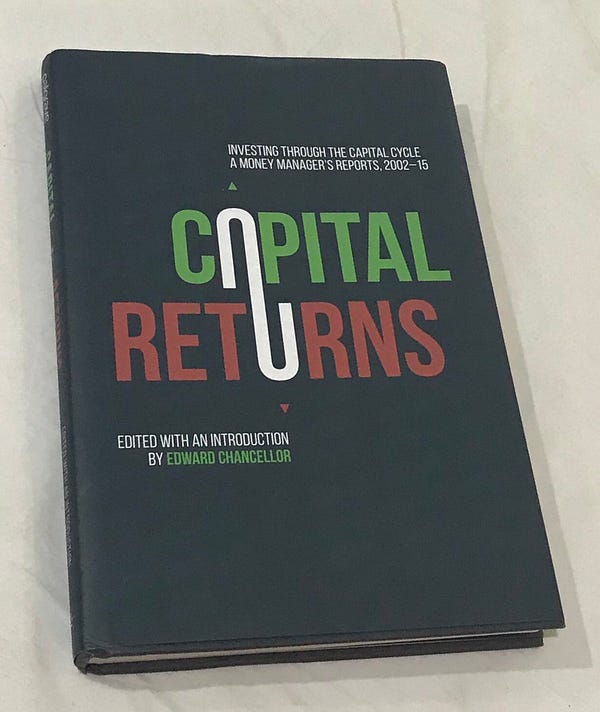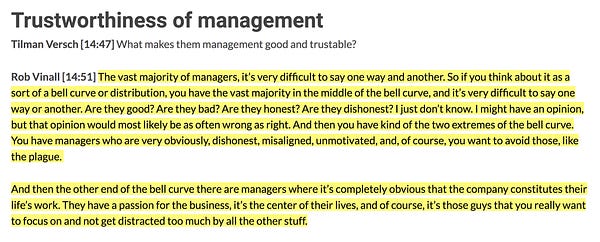Welcome to the 19th edition of the Rational Cloning Newsletter (Weekly Ideas Series).
Helping you discover the best ideas of others.
Happy cloning.
Weekly Investment Ideas
(1) Baron Real Estate Fund Q4 2021 Letter
General Comments
The fourth quarter of 2021 was a particularly active period managing the portfolio. We believe our action steps have positioned the Fund for strong performance in 2022. They included:
a. Raising cash by trimming or exiting expensive real estate securities of businesses that we anticipate will face operational headwinds
b. Purchasing best-in-class real estate-related securities that were “on sale” (e.g. Brookfield Asset Management Inc., Jones Lang LaSalle Incorporated, Hyatt Hotels Corp., Lennar Corporation, D.R. Horton, Inc., Lowe’s Companies, Inc., Equity Residential, and Invitation Homes, Inc.)
c. Purchasing cyclical real estate stocks – several travel and hospitality related real estate stocks – that had declined sharply (in some cases by 25% to 60% from 2021 share price highs!) but possess the potential to appreciate significantly over the new few years (e.g. MGM Resorts International, Boyd Gaming Corporation, Marriott Vacations Worldwide Corp., Caesars Entertainment Corporation, Six Flags Entertainment Corporation, Penn National Gaming, Inc., Las Vegas Sands Corporation, Tripadvisor, Inc., and Madison Square Garden Entertainment Corp)
Near-Term Case for Real Estate
(1) Demand continues to outstrip supply
(2) Business conditions remain solid for most of our real estate companies – both residential and commercial real estate – and the outlook does not portend a recession
(3) Balance sheets are strong
(4) The real estate cycle has reset, and we believe the multi-year outlook is attractive
(5) Substantial private capital is still in pursuit of real estate ownership supported by widely available debt capital at low interest rates
(6) We continue to identify real estate companies that remain on sale and are attractively valued
Long-Term Case for Real Estate
(1) Solid historical long-term returns with ongoing potential
(2) Diversification and low correlation to equities and bonds
(3) Inflation protection
a. MGM Resorts International
MGM Resorts is a global casino and entertainment company operating 19 properties throughout the Las Vegas Strip, Macau, and the broader U.S. Approximately 80% of the company’s cash flow is generated in the U.S. We believe the company is well positioned to benefit from an ongoing recovery in Las Vegas. The company’s BetMGM iGaming business is the clear leader in the U.S. with 30% market share, and its combined sports betting and iGaming business is the #2 ranked business by market share in the U.S. Following several prudent strategic and financial steps, MGM Resorts will soon have more than $10 billion of cash that it can deploy for additional growth opportunities, share repurchases, dividends, debt reduction, and other opportunities to create shareholder value.
b. Las Vegas Sands Corporation
Following a close to 50% decline in the share price of Las Vegas Sands from its 2021 peak share price of $67 to $35, we began acquiring shares of this global leader in the development and operation of luxury casino resorts. We believe Las Vegas Sands’ market leading resorts in Macau and Singapore position the company for strong growth when travel and tourism spending rebounds. Las Vegas Sands maintains a liquid and investment grade balance sheet and is currently valued at a significant discount to our assessment of replacement cost.
c. Boyd Gaming Corporation
Boyd is one of the largest and most successful casino entertainment companies in the U.S. The company owns and operates 28 casino gaming properties in 10 states with a large presence in Las Vegas and a geographic focus on the drive-to, leisure gaming customer. We remain optimistic about the prospects for Boyd’s shares because business conditions are strong, management maintains a liquid and conservatively capitalized balance sheet, insiders own approximately 27% of the company, the shares remain attractively valued at only 7.5 times 2022 estimated cash flow and a double-digit free cash flow yield, and we believe the company could be an attractive acquisition candidate should its current valuation remain discounted relative to recent private market casino and gaming transactions.
d. Floor & Decor Holdings, Inc.
Following a recent correction in its share price and time spent with management, we began acquiring shares in Floor & Decor, a leading and high-growth specialty retailer of hard-surface flooring offering the industry’s broadest in-stock selection of tile, wood, laminate, vinyl, and natural stone flooring. We are optimistic about the long-term, multi-pronged growth prospects for the company. They include the potential to grow its store count in the U.S. from 153 stores to more than 400 stores, strong comparable store sales growth, growth in the company’s online business, growth opportunities with professional and commercial customers and designer services. The company is also well positioned to benefit from the cyclical and secular tailwinds that should aid the U.S. housing market in the years ahead.
e. Equity Residential
Equity Residential is the largest U.S. apartment REIT with a portfolio valued at $45 billion. The company primarily focuses on major markets such as Los Angeles, Seattle, San Francisco, Boston, and New York, but has begun to also prioritize Sun Belt markets and other growing cities like Denver. Equity Residential maintains a strong and liquid balance sheet. We recently spent time with management and are encouraged about the company’s prospects for growth in the year ahead.
(2) Nitor Capital Management 2022 Annual Letter
a. Vistra Energy Corp
We have now held an investment in Vistra Energy Corp. for over three years and further increased our position during 2021. We believe Vistra offers an incredibly attractive risk/reward profile.
As of the end of 2021 Vistra was trading at under 3.5x this year’s cash flow and more importantly 5.5x the midpoint of management’s estimated free cash flow. This equates to a cash flow and free cash flow yield of 28% and 18% respectively.
On an EV to EBITDA basis, which factors in the Company’s net leverage Vistra is selling at under 7x EBITDA. As mentioned earlier, had an investor bought into Nextera Energy in 2012 at just 6x cash flow (9x EBITDA) or a 16% cash flow yield they would have generated nearly double-digit annualized returns over the next 10 years irrespective of future multiple expansion.
While Vistra’s underlying business is by no means comparable to Nextera’s, we still believe it is a unique and one-of-a-kind business selling at a nonsensical valuation. Unlike Nextera, Vistra does not own transmission assets and operates in unregulated power markets such as Texas. That being said, as our investors hopefully know by now, we do not invest in companies simply because they are ‘cheap.’
Vistra owns irreplaceable assets and infrastructure and the Company produces and sells a product that its customers cannot live without. Lastly, management is clearly focused on unlocking and maximizing shareholder value as they have recently implemented a capital allocation plan designed to return $7.5b to shareholders over the next 5 years. This equates to 70% of the Company’s current market cap.
We think of Vistra Energy as a Class A real estate property located in a non-desirable market. A Class-A rental property in a tier-1 market might typically sell for 3% to 4% cash flow yield.
b. CF Industries (CF)
Since we initiated an investment in CF Industries in early 2020 the stock price has increased by roughly 2.5x. Yet, as of the end of 2021, CF was still selling at under 9x trailing cash flow and an 8% trailing free cash flow yield. CF is one of the worlds largest manufacturers of Nitrogen Fertilizer. The Company controls a 40% market share of US fertilizer production and owns the world’s largest and lowest cost fertilizer manufacturing facility in the world located in Southeast Louisiana.
The Company continues to be valued as a highly cyclical, low margin, commodity manufacturer. Yet, this could not be further from the truth. CF’s location and low-cost production advantage provides the Company with a one-of-a-kind global competitive manufacturing advantage of a product the world cannot live without (world needs food, to have food you must plant and in order to plant one must apply Nitrogen fertilizer every year).
CF is incredibly cheap relative to cash flow generation at current and normalized fertilizer prices.
In summary CF continues to boast a one-of-a-kind competitive advantage, sells a product the world cannot live without and is led by management with a proven track record of shareholder value creation. Using trough fertilizer prices CF is selling at a 6.5% free cash flow yield. Using prices at the global cost curve the Company is selling at a 13% free cash flow yield and at current fertilizer prices CF selling at a 20% free cash flow yield. Unlike many areas of the market, CF continues to be undervalued, continues to offer a substantial margin of safety and continues to offer significant room for future gains.
c. St. Joe
Since the start of 2019 when we featured St. Joe in our annual letter the stock has returned over 300%. Yet, despite increasing by 4x in price the stock continues to sell at a significant discount to net asset value and offers material long-term upside as the underlying value of the Company has grown well beyond our original expectations.
St. Joe ended 2021 at a $3 billion market cap. At the current valuation, JOE is selling at a 5% forward cash flow yield. Considering the Company’s growth, and clear monopoly on one of the fastest growing areas of the Country we believe JOE remains drastically undervalued. In fact, on fundamental cash flow valuation the stock is cheaper now than it was at the end 2019 when trading at $19 per share.
As discussed in prior letters we have visited St. Joe on multiple occasions and have gone through every parcel of land the Company owns via on site visits and tracking the value through transactions posted on county’s assessor website. JOE continues to own roughly 25,000 developable acres that are either immediately adjacent to major roadways or fronting water. Land that fronts main roadways is highly valuable for commercial development and waterfront land is highly valuable when it comes to residential development. In these areas land has been selling from anywhere between $250,000 per acre to over $1m per acre. St. Joe has another 50,000 acres immediately adjacent or surrounding existing development and density that sits within 5 to 6 miles of the coastline. Land located in these areas has been selling from anywhere between $50,000 per acre to $250,000 per acre. There is almost no plausible scenario in which JOE’s current implied per acre value can be justified [$27,200].
St. Joe’s valuation continues to be penalized for owning too much land.
Tweets That Make You Go… Hmm 🤔












